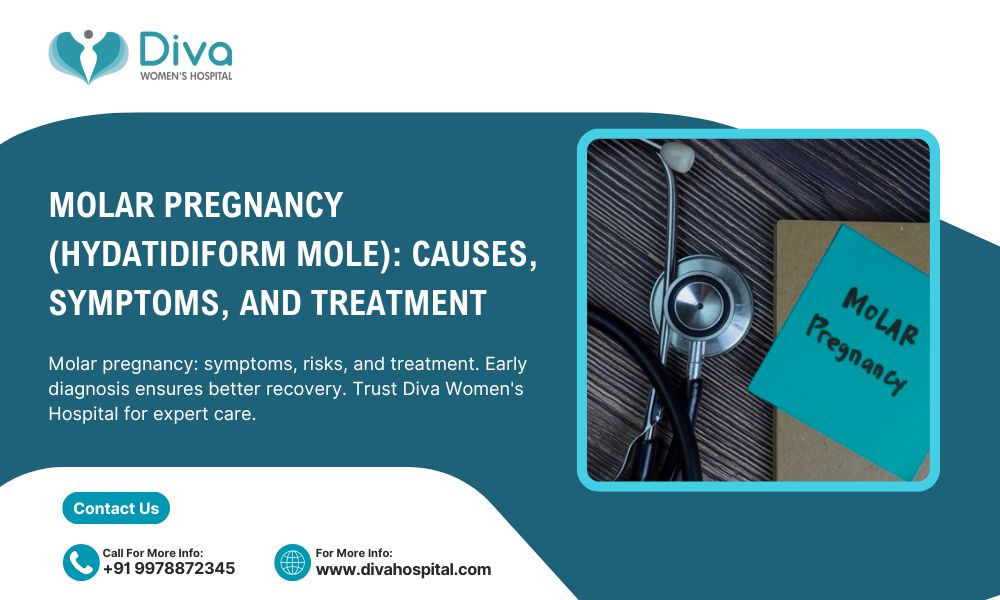A molar pregnancy, also called a hydatidiform mole, is an uncommon pregnancy problem whereby aberrant tissue grows in the uterus rather than a healthy embryo. Early discovery and treatment can help avoid difficulties even though this pregnancy is not viable. Women’s reproductive health depends on an awareness of the signs, causes, and treatment choices for a molar pregnancy.
Expert treatment for all pregnancy-related disorders including hydatidiform mole detection and treatment is offered at Diva Women’s Hospital. This blog will go over what you need to know about molar pregnancy, thereby enabling you to spot the symptoms and get quick medical advice.
What is a Molar Pregnancy?
A molar pregnancy is a form of gestational trophoblastic disease (GTD) whereby the fertilised egg becomes an aberrant mass of cells rather than a baby. Chromosomal defects in the fertilised egg cause this.
-
Complete Molar Pregnancy
- Neither normal foetal tissue nor any embryo forms.
- The placenta develops unusually into a mass of cystic sacs loaded with fluid.
- Results from a sperm fertilising an empty egg, hence duplicating paternal DNA.
-
Molar Pregnancy in Partials
- An embryo forms but cannot survive with significant genetic flaws.
- Results from two sperm fertilising one egg producing an aberrant chromosomal count.
- The placenta could feature both normal and aberrant tissue.
To eliminate the aberrant tissue and avoid difficulties, both forms of molar pregnancy requires medical intervention.
Causes and Risk Factors of Molar Pregnancy
Although the precise origin of a hydatidiform mole is unknown, some risk factors could raise a molar pregnancy risk:
Maternal Age: Women under 20 or over 35 run more danger.
Previous Molar Pregnancy: Should you have one already, your chances of recurrence rise.
Nutritional Deficiencies: Low levels of vitamin A or folic acid could cause aberrant fertilisation.
History of Miscarriage: Women who have gone through several miscarriages could be more vulnerable.
Genetic Factors: Molar pregnancy risk is raised in some chromosomal disorders.
Any one of these risk factors should cause women to get early prenatal tests to find any pregnancy anomalies.
Symptoms of Molar Pregnancy
Although at first a molar pregnancy feels like a regular pregnancy, some warning signals point to a problem. Common symptoms include:
- Vaginal bleeding – Dark brown or bright red bleeding in the first trimester.
- Severe nausea and vomiting – More extreme than normal morning sickness.
- Rapidly growing uterus – The uterus may appear larger than expected for gestational age.
- Pelvic pain or pressure – Discomfort in the lower abdomen.
- High hCG levels – Blood tests may show excessively high pregnancy hormone levels.
- No fetal heartbeat – Ultrasound scans do not detect a developing baby.
If you experience any of these symptoms, it is important to seek medical attention immediately. Early diagnosis and treatment are essential to prevent complications.
Diagnosis of Molar Pregnancy
Diva Women’s Hospital’s doctors diagnosis a hydatidiform mole by combining tests:
An aberrant uterine tissue growth can be found in a transvaginal ultrasonic scan.
hCG Blood Test: Usually, a molar pregnancy causes quite high levels of human chorionic gonadotropin (hCG).
The doctor looks for aberrant uterine development and oedema during a pelvic examination. These tests guide treatment decisions and assist to verify the existence of a molar pregnancy.
Treatment Options for Molar Pregnancy
Treatment of a molar pregnancy should start right away to eliminate the aberrant tissue and stop more difficulties. The primary therapeutic choices are:
- Dilation and curettage (D&C)
- The most often used technique for excision of molar tissue.
- Using suction and mild scraping, the doctor dilates the cervix and eliminates the aberrant growth.
- Usually an outpatient surgery, done under anesthesia.
- Prescription drugs
- Sometimes molar tissue is naturally expelled with the help of drugs.
- Suggested if the patient would not be suited for surgical removal.
- Watching and Following Up
Following therapy, regular hCG blood tests are needed to make sure all aberrant cells are eliminated.
- Reduced hCG levels validate effective elimination.
- To guarantee total recovery, patients are advised to wait at least six to twelve months before trying to conceive once more.
Our doctors at Diva Women’s Hospital give individualized treatment to guarantee a safe and seamless molar pregnancy recovery.
Possible Complications of Molar Pregnancy
While most molar pregnancies are handled successfully, problems are rare even so. Among these include persistent gestational trophoblastic disease (GTD), in which molar tissue stays in the uterus and keeps developing necessitating more treatment.
- Rare cancer known as choriocarcinoma arises from molar pregnancy cells. Chemotherapy makes it quite curable.
- A molar pregnancy can be really anxious. Patients can help themselves by means of counselling and support groups.
- Most women recover totally and go on to have healthy pregnancies in the future with early identification and appropriate medical treatment.
Can You Have a Healthy Pregnancy After a Molar Pregnancy?
After healing from a hydatidiform mole, most women can indeed have a safe pregnancy. Usually advised by doctors is to wait at least six to twelve months before attempting another pregnancy. Frequent visits and close observation will help to guarantee a seamless pregnancy path.
For ladies who have had molar pregnancy, Diva Women’s Hospital offers fertility advice and professional direction. Our staff is committed to enable you to have a safe and healthy pregnancy in the future.
A rare but treatable disorder called a molar pregnancy—hydatidiform mole—requires early detection and medical care. See a doctor right once if you have symptoms including severe nausea, vaginal bleeding, or an unusually big uterus. Most women recover totally and can have healthy pregnancies going forward with appropriate therapy.
Our specialty at Diva Women’s Hospital is the diagnosis, treatment, and follow-up care for molar pregnancy sufferers. Every patient is guaranteed the greatest medical treatment and emotional support by our caring staff. Get in touch with Diva Women Hospital right immediately if you or someone you know requires professional treatment for molar pregnancy!

